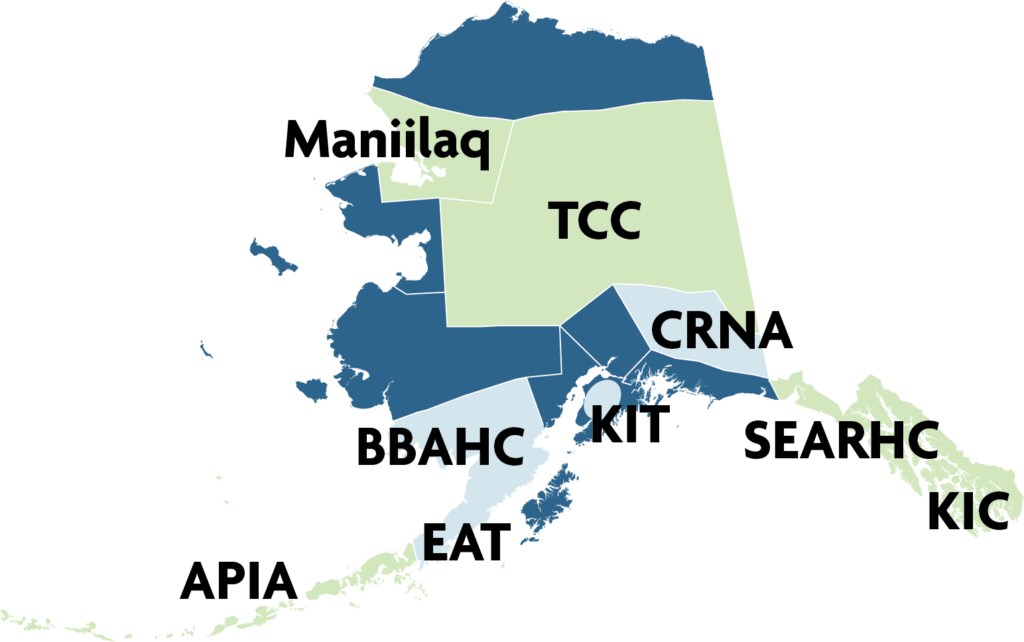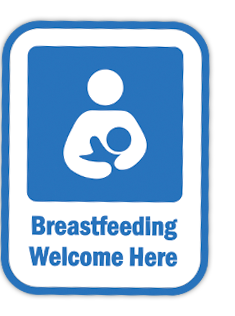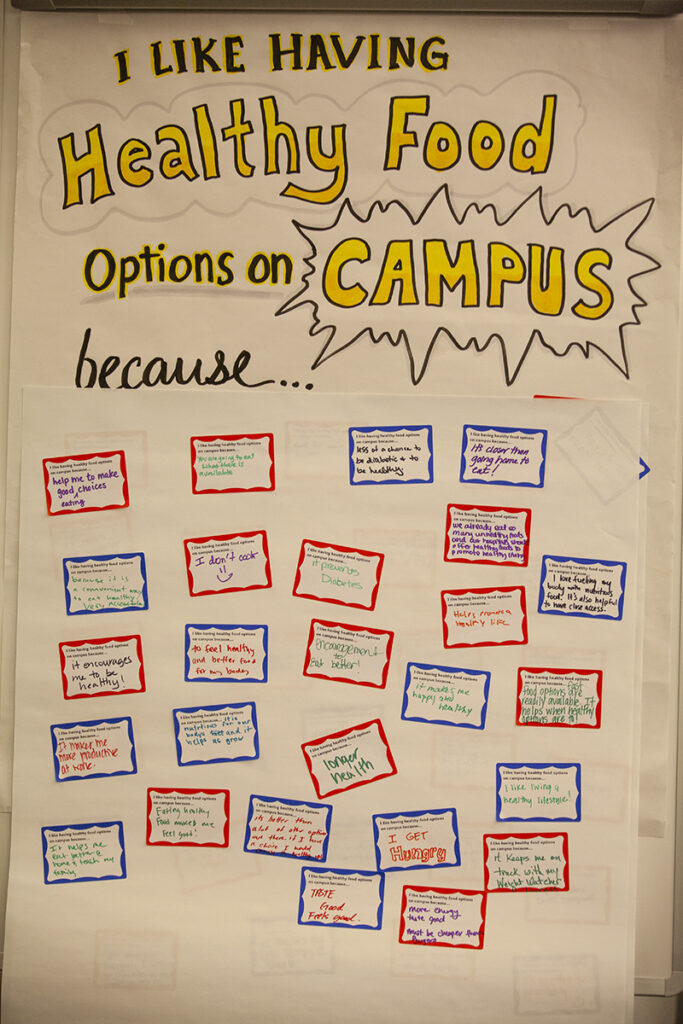
Wellness Strategies for Health (2014-2019)
Wellness Strategies for Health (WSH) was a Centers for Disease Control and Prevention (CDC) funded program (Good Health and Wellness in Indian Country (GHWIC) grant #NU58DP005422) that aimed to reduce heart disease, diabetes, and stroke among Alaska Native and American Indian people. The program focused on supporting healthy behaviors through effective public health approaches such as policy, systems, and environmental changes.
To achieve the goals of the program the Alaska Native EpiCenter (EpiCenter) worked with five regional tribal health organization (THO) partner sites and other organizations throughout the state to increase access to traditional and healthy foods, increase physical activity, reduce tobacco use, improve health literacy, promote breastfeeding, and enhance chronic disease management.
THO Partner Sites
Beginning in 2014, the EpiCenter partnered with five THOs including the Aleutian Pribilof Islands Association (APIA), Ketchikan Indian Community (KIC), Maniilaq Association, Southeast Alaska Regional Health Consortium (SEARHC), and Tanana Chiefs Conference (TCC) to carry out grant activities in their regions. In 2015, each THO partner site completed a community health assessment and developed an action plan around their chosen focus areas. WSH Program Overview PDF
Since 2016 the EpiCenter has partnered with four additional THOs to conduct a gaps and opportunities analysis of tobacco-related policies in their regions and identify policy or systems change opportunities around tobacco use in their regions. The new THOs include Bristol Bay Area Health Corporation (BBAHC), Eastern Aleutian Tribes (EAT), Copper River Native Association (CRNA), and Kenaitze Indian Tribe (KIT).

Aleutian Pribilof Islands Association (APIA)

APIA implemented healthcare system changes to ensure that all patients are screened for tobacco use and referred to tobacco cessation services if they are ready to quit. APIA also passed a policy in 2016 that creates a tobacco-free environment by prohibiting tobacco use on all APIA property, including in vehicles.

APIA worked on healthcare systems changes to ensure that all patients are screened for diabetes, pre-diabetes, and obesity and referred for additional care as needed. APIA also developed policies and procedures for implementing group medical visits and trained staff in the group medical visit process.

APIA addressed health literacy by training staff on the “Teach Back” method, assessing health literacy policies and practices in all of their clinics, and updating health education materials in their clinics.
APIA website | APIA Community Health Assessment | Community Profile | Activity Spotlight | Activity Spotlight
Ketchikan Indian Community (KIC)

KIC passed a tobacco-free campus policy in 2016 that prohibits tobacco use at all KIC locations and in all tribally-owned or leased vehicles. KIC also worked on screening and referral efforts to ensure tobacco users who are interested in quitting are connected with tobacco cessation services, with a focus on individuals seen at the KIC Health Clinic and youth enrolled in the KIC Tribal Scholars Program.

KIC instituted policies that ensure that all patients diagnosed with diabetes are offered the opportunity to participate in the KIC Diabetes Self-Management Program and patients diagnosed with pre-diabetes are offered the opportunity to participate in the KIC Pre-Diabetes Education Program.
KIC website | KIC Community Health Assessment | Community Profile | Activity Spotlight | Activity Spotlight
Maniilaq Association

Maniilaq Association added the “Teach-back” training as a requirement for clinical staff at hire and as part of their annual employee training program. Maniilaq also updated their discharge policy and procedures to include use of “Teach-back” as a standard practice.

Maniilaq passed a policy in 2016 that standardizes the process for height and weight screening and ensures that patients at risk of health problems due to excess weight are offered a referral to a dietician.
Maniilaq website | Maniilaq Community Health Assessment | Community Profile | Activity Spotlight | Activity Spotlight
SouthEast Alaska Regional Health Consortium (SEARHC)


SEARHC became a designated Baby-Friendly hospital, a process that involved implementing the Ten Steps to Successful Breastfeeding outlined by Baby-Friendly and completing an assessment process that verified implementation of each of the steps.

To increase opportunities for physical activity for staff, families, and Tribal members SEARHC upgraded their on-site fitness center, extended the facility hours, and offered staff and Tribal members the option of sponsoring two people. SEARHC also implemented a “StairWell” campaign to encourage staff and visitors to take the stairs instead of the elevator. In addition, SEARHC was recognized as a bicycle-friendly business by the League of American Bicyclists and currently holds the Bronze Level.

SEARHC offered and promoted healthy meal options, known as “Mindful Meals” and developed a punch card incentive system that offers discounts on “Mindful Meal” purchases, including a 15% discount for employees. SEARHC also removed soda from their temporary housing facility and modified the beverage machine at the hospital so that healthier options are placed at the top level and water is offered at the same price as other beverages. Other vending machines offer healthy options like small salads, fruit, and low fat yogurt. SEARHC also conducted a public education campaign on the health effects of sugar sweetened beverages.

SEARHC recently amended their visitor policy to clearly state that smoking is not allowed on the SEARHC campus. They also added information about the tobacco-free campus policy and tobacco cessation resources to their new employee orientation. In addition, new tobacco-free policy signs were posted on light posts.

SEARHC made changes to their Outpatient Department workflow that include referral to a lifestyle counselor trained in motivational interviewing. The lifestyle coach can follow up with patients to ensure that provider instructions are clear and assist them in accessing and using health information and health services.
SEARHC website | SEARHC Community Health Assessment | Community Profile | Activity Spotlight | Activity Spotlight
Tanana Chiefs Conference (TCC)

TCC passed a healthy food policy in 2016 that sets nutritional guidelines for foods served at TCC facilities and ensures that healthy options are available for TCC staff and patients. Watch the videos for more information on the TCC healthy food policy.

TCC developed electronic health record reminders that prompt clinical staff to conduct additional assessment of patients at risk for diabetes and pre-diabetes. Patients can then be referred to diabetes prevention or management programs offered by TCC.
TCC website | TCC Community Health Assessment | Community Profile | Activity Spotlight | Activity Spotlight
Statewide Projects

The EpiCenter partnered with the State of Alaska Obesity Prevention and Control Program to support the Play Every Day public education campaign, which works to increase public awareness about the health risks of childhood obesity, the importance of physical activity, and the consumption of healthy foods and beverages.
Activity Spotlight: Play Every Day Partnership
In 2018, the EpiCenter’s WSH Program in partnership with Play Every Day created a public service announcement (PSA) promoting physical activity. Kids from Petersburg, Sitka, Unalakleet, Bethel, Utqiaġvik and other communities shared the message to support every kid, every day, to get out and play all across Alaska!
In 2016, the EpiCenter partnered with Play Every Day to produce two video PSAs highlighting healthy activities in rural communities.

The Campus Healthy Food (CHeF) Project began in 2018, when the EpiCenter partnered with the State of Alaska Division of Public Health on the State Physical Activity and Nutrition (SPAN) program, a five-year grant program funded by the Centers for Disease Control and Prevention’s Division of Nutrition, Physical Activity, and Obesity.
Healthy Food Initiative website

Digital stories are based on personal experiences and told from the first-person perspective. In 2017 the EpiCenter sponsored two digital storytelling workshops that focused on health and wellness in THO partner site communities. Some of the videos produced:

The EpiCenter partnered with the Tobacco Prevention and Control Programs at ANTHC and the State of Alaska to promote tobacco-free policies and implement health care system practices that support patients who want to quit.
The EpiCenter worked with the five WSH THO partner sites as well as Bristol Bay Area Health Corporation (BBAHC), Eastern Aleutian Tribes (EAT), and Copper River Native Association (CRNA) to conduct a gaps and opportunities analysis of tobacco-related policies in their regions. Each organization identified policy or systems change opportunities to work on and received technical assistance from the EpiCenter in making those changes.
The EpiCenter also partnered with the ANTHC Tobacco Prevention and Control Program to support implementation of the Alaska Native Health Campus tobacco-free policy by updating campus signage, conducting focus groups with tobacco users, and developing videos that explain the policy to visitors and staff.
- Policy Overview Video (YouTube)
- Video for ANTHC Staff (YouTube)

The EpiCenter collaborated with ANTHC Human Resources staff to load the “Always Use Teach-back” interactive learning module into HealthStream, ANTHC’s online employee training system that is also used by several other tribal health organizations in Alaska. “Teach-back” is an evidence-based communication strategy that health care providers can use to ensure that they have explained information in an understandable way.
The EpiCenter also developed an organizational health literacy assessment tool that THO partner sites used to identify steps their organizations could take to make it easier for people to obtain, understand, and use health information and health services.

In March 2018, the EpiCenter hosted a session at the Community Health Aide/Practitioner (CHA/P) Forum. Participants shared ideas on ways to make healthy behaviors, like eating well, being physically active, and not using tobacco, easier in their communities. The poster below highlights some of the ideas shared during the workshop. Activity Spotlight PDF
